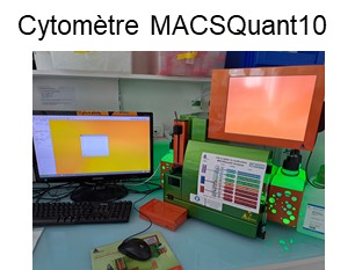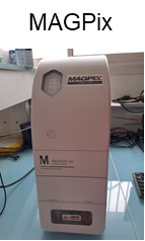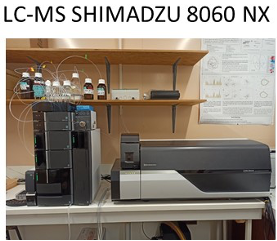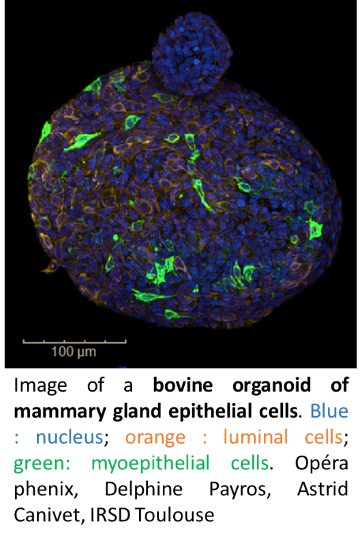Immunology and ALTernative to Antibiotics
Research themes
The IALTA team is dedicated to studying the mechanisms of immunity in response to infection, taking into account the host’s genetic background. As part of its work, the research team has developed methods to strengthen the immune system of ruminants against common infectious pathogens. These innovative methods include inducing the innate compartment and strengthening physical defenses at the level of contact barriers with pathogens, such as the mammary gland or lung. The research focuses on the predominant diseases affecting the studied species (cattle, sheep, goats), including both mammary or respiratory infections.
The ultimate goal of the actions carried out is to improve the control of infectious diseases (including emerging ones) through a better understanding of infectious mechanisms and the host response.ctions.
Research topics related to bovine health
- Physiopathology of genetic abnormalities in the innate and adaptive immune response
- Role of the microbiota in immune response
- Immunostimulation to improve health
- HOT TOPICS: Emerging diseases in cattle
- Development of new diagnostic methods for respiratory diseases
Core expertise

Flow cytometry
The laboratory is equipped with a MACSQuant10 (Miltenyi) flow cytometer with three excitation lasers (405 nm, 488 nm, and 635 nm) and eight emission channels (V1 450/50, V2 525/50, B1 525/50, B2 585/40, B3 655-730, B4 750LP, R1 655/730, R2 750LP). It is available for unit teams for their analyses.
Contact: Blandine Gaussères blandine.gausseres@envt.fr

Multiplex analysis of cytokines from multiple species
The laboratory has a MAGPix system, which enables the quantification of various analytes using magnetic beads. Up to 50 analytes can be simultaneously detected from 25 µL of sample (serum, plasma, culture supernatant, etc.). Analyses are routinely performed on samples from bovine, ovine, murine, caprine, canine, and equine origins.
Contact: Blandine Gaussères blandine.gausseres@envt.fr

Targeted lipidomics
The study of sphingolipids and oxylipins is an innovative approach to investigating inflammation and cell signaling. Their analysis is made possible through targeted LC-MS/MS, allowing the characterization of 150 sphingolipids and 100 oxylipins.
Contact: Philippe Guerre philippe.guerre@envt.fr and Alix Pierron alix.pierron@envt.fr

In vitro, Ex vivo and In vivo models
The team has strong expertise in the isolation, culture, and use of primary bovine cells derived from blood or tissues such as the mammary gland, lung, or intestine. To study the role of trained immunity or associated immune responses, murine infection models infection (mammary gland, intestinal, pulmonary, sepsis, etc.) with Escherichia coli or Staphylococcus aureus, combined with the invalidation of specific immune genes (CLEC7A, SOCS2), are used. In addition, innovative bovine organoid models of the mammary gland and tonsil are being developed within the team. Tissues from animals with specific immune pathways disabled (integrins, JAK/STAT, etc.) are stored in a biobank for the future development of primary cell lines or organoids from organs of interest (intestine, mammary gland, lung, skin, bladder, tonsils, etc.).
Contact: Delphine Payros delphine.payros@inrae.fr and Gilles Foucras gilles.foucras@envt.fr
People
Permanent members
- Gilles FOUCRAS (Professor, head of the team, ENVT) ORCID 0000-0002-0363-0337
- Philippe GUERRE (Professor, ENVT), ORCID 0000-0002-9777-3784
- Delphine PAYROS (CRCN, INRAE) ORCID 0000-0003-4820-7986
- Alix PIERRON (Associate Professor, ENVT) ORCID 0000-0001-9510-4790
- Blandine GAUSSERES (Research engineer, INRAE) ORCID 0000-0001-7570-4721
- Didier TARDIEU (Research engineer, ENVT)
- Christian TASCA (Research technician, INRAE)
PhD Students and ECBHM residents (European College of Bovine Health Management)
- Elodie LASSALETTE, PhD student (CIFRE program with Olmix, 2024 – 2027), ORCID 0009-0000-2986-5057
- Lucie DUTHEIL, resident (2022 – 2025), PhD student (2023 – 2026), ORCID 0009-0001-9742-4031
- Lisa ARNALOT, PhD student 50% IALTA, ENVT ; 50% EIP Purpan (2022 – 2025), ORCID 0009-0002-5784-0935
- Maud ROUAULT, PhD student 50% IALTA, ENVT ; 50% Oniris, Nantes (2021 – 2025), ORCID 0000-0003-4169-5542
5 main publications
Dutheil L, Gausseres B,Besnard F, Guzylack-Piriou L, Abou Monsef Y, Gaide N, Arnalot L, Corbiere F, Gaborit M, Launay F, Poujade A, Capitan A, Foucras G. Bovine Lymphocyte Intestinal Retention Defect (BLIRD): a novel recessive immunogenetic disorder in Holstein cattle. Vet Q. 2025;45(1):2566997.
Guzylack-Piriou L, Gausseres B, Tasca C, Hassel C,Tabouret G, Foucras G. A loss of function mutation in SOCS2 results in increased inflammatory response of macrophages to TLR ligands and Staphylococcus aureus. Front Immunol. 2024; Aug 9:15:1397330.
Pierron A, Guzylack-Piriou L, Tardieu D, Foucras G, Guerre P. Zymosan-induced murine peritonitis is associated with an increased de novo sphingolipid synthesis without changing the long to very long chain ceramide ratio. Int. J. Mol. Sci. 2023; 24(3):2773.
Lesueur J, Walachowski S, Barbey S, Cebron N, Lefebvre R, Launay F, Boichard D, Germon P, Corbiere F and Foucras G. Standardized whole blood assay and bead-based cytokine profiling reveal commonalities and diversity of the response to bacteria and TLR ligands in cattle. Front Immunol 2022;13:871780.
Hassel C, Gausseres B, Guzylack L, and Foucras G. Ductal macrophages predominate in the immune landscape of the lactating mammary gland. Front Immunol 2021;12:754661.